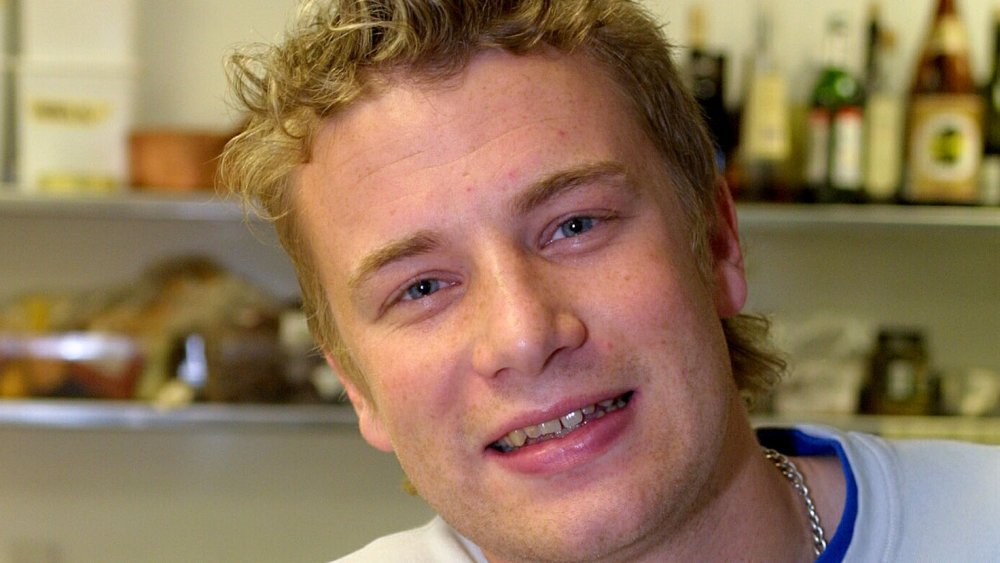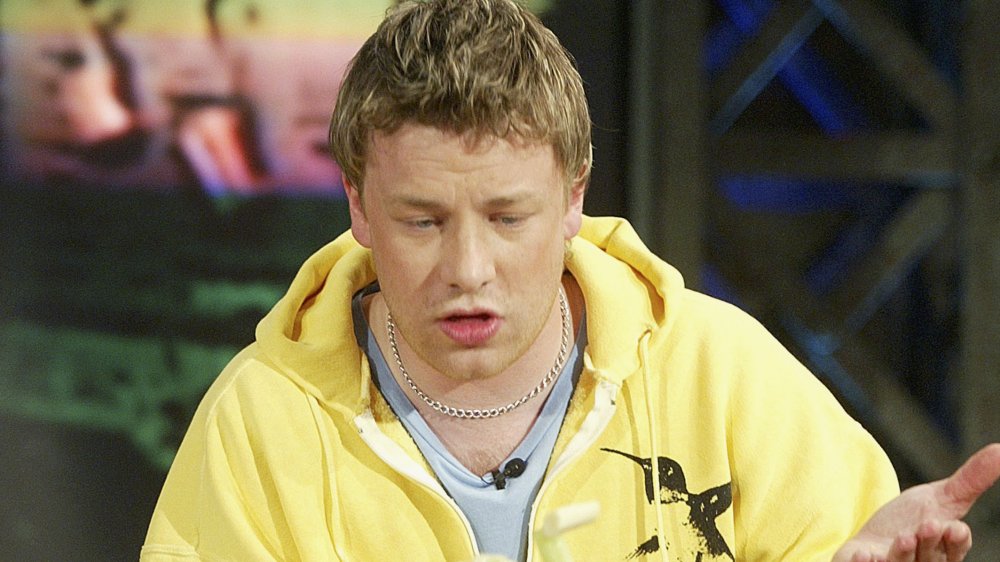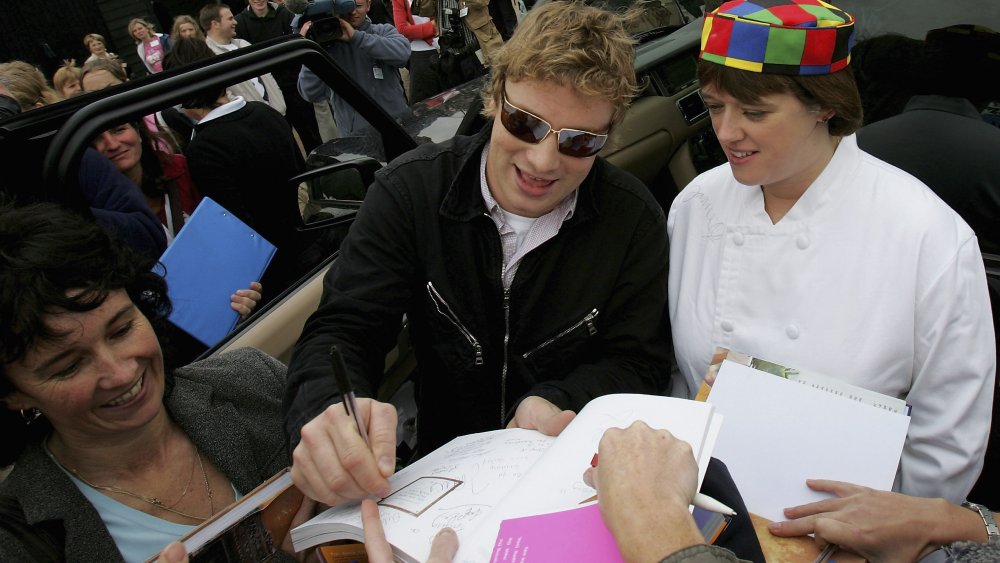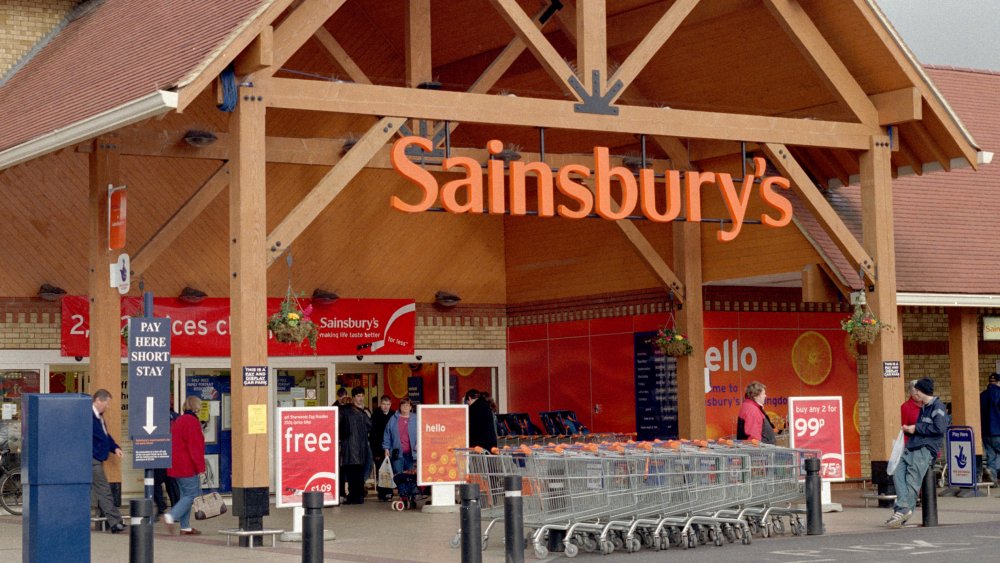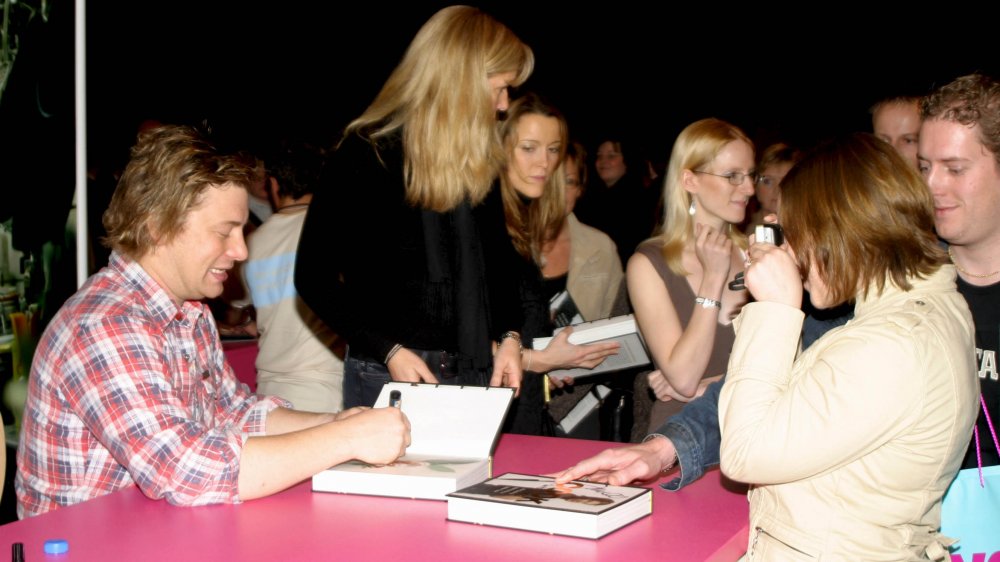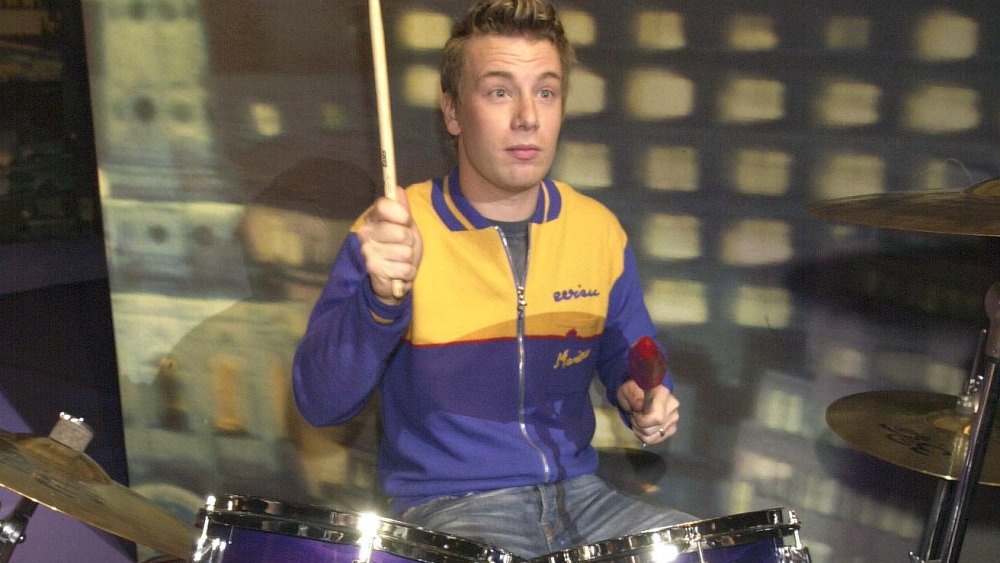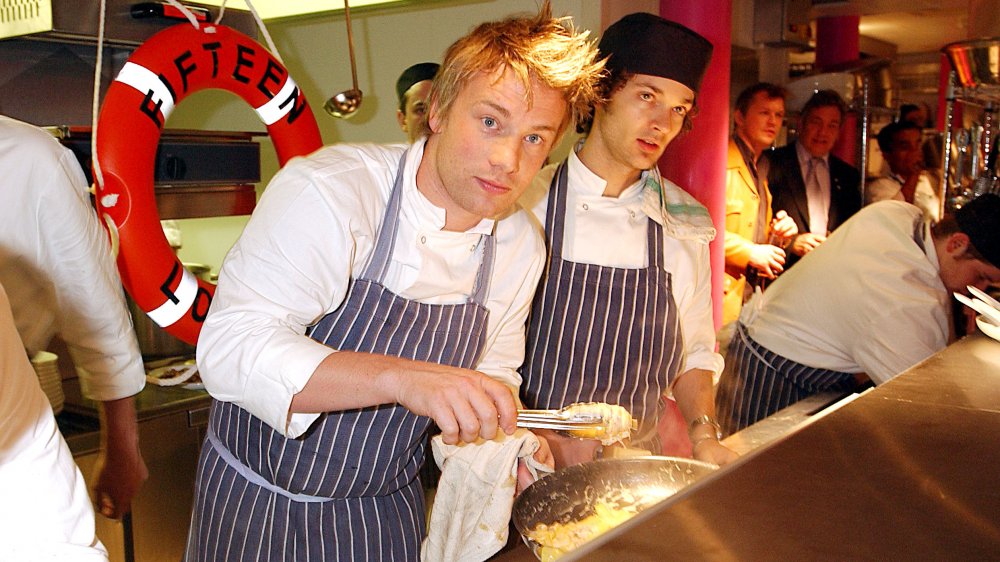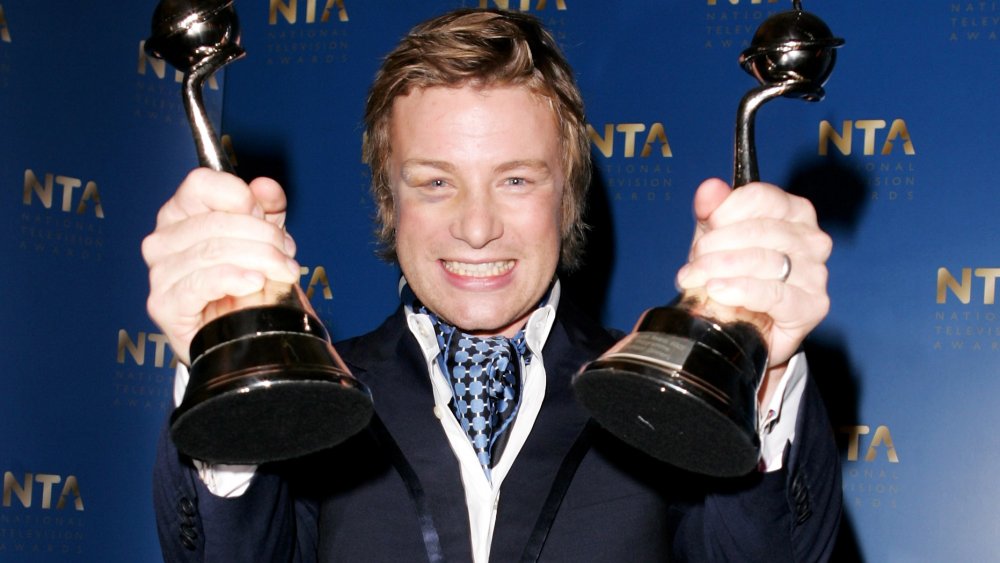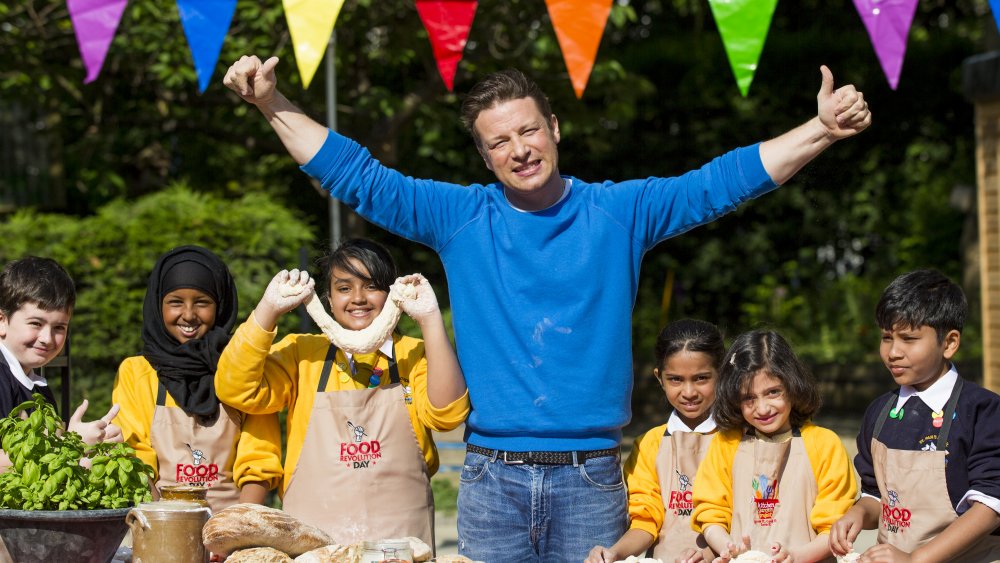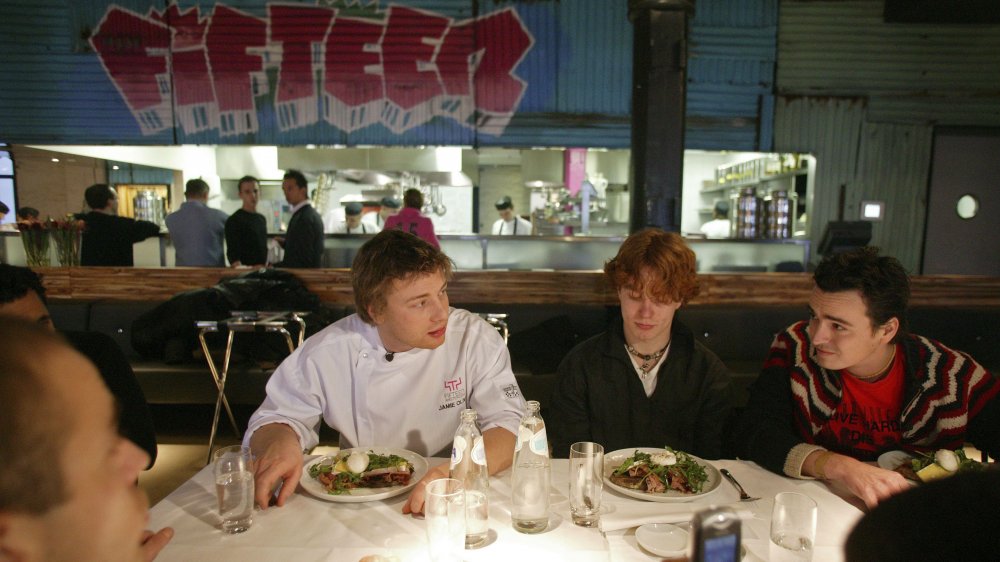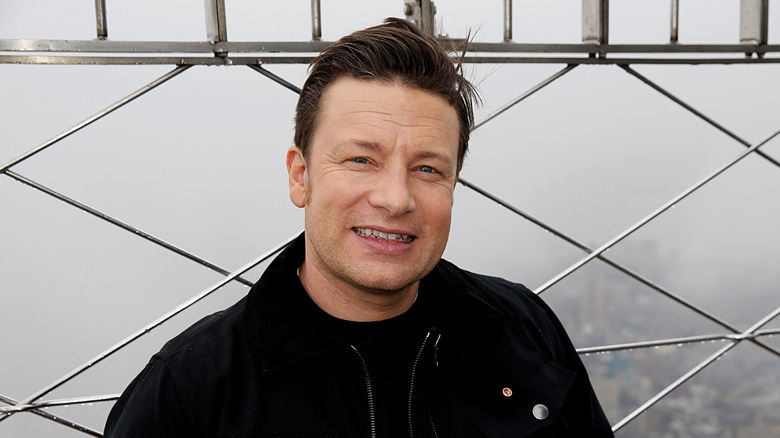The Real Reason Why The Naked Chef Was Cancelled
We may receive a commission on purchases made from links.
It's been over 21 years since then-23-year-old British chef Jamie Oliver's game-changing cooking show, The Naked Chef, debuted on BBC 2 in England, before crossing the pond to air on the Food Network. While it may be a lifetime in chef show years since The Naked Chef made its mark, some fans still wonder why Oliver's uber-popular program disappeared into the ether at the close of 2001. But in order to understand why Oliver parted ways with the show that launched his career, we need to take stock of his life and career.
For the uninitiated, there was nothing remotely "naked" about the wunderkind chef who won the hearts of viewers (particularly women) from the get-go. The show's provocative title, according to Now to Love, referred to Oliver's style of preparing stripped-down dishes with superlative flavor and minimum effort, something of a revelation for its time. The recipes might have had a modicum of ingredients, but they didn't lack personality — after all, they were concocted by winsome Oliver, a chef with charm to spare.
Let's dig into the real reason why The Naked Chef was cancelled.
Jamie Oliver was an overnight success story
After working as a kid at his parent's pub, in Clavering, Essex, England, and attending Westminster Catering College, Jamie Oliver eventually landed a job as a sous chef for The River Café, the famed Italian restaurant in London. The Australian news site, News.Com.Au, notes that one day, a colleague called in sick, and Oliver, who had the day off, took his place. It turned out to be a date with destiny, for who should turn up in the kitchen but a BBC television team, onsite to shoot the 1997 documentary, Christmas at the River Cafe.
He was part of the kitchen team, but never mind: Oliver's singular charisma was apparent to the late Patricia Llewellyn, the producer behind the British sensation, Two Fat Ladies. Convinced of his appeal, she spent almost a year persuading BBC higher-ups that the shaggy blond boy-chef deserved his own show.
Contract signed, cool East London flat rented as the backdrop, they were ready to roll. A concept soon emerged that allowed Oliver to relax and chat with Llewellyn while slicing, dicing, and prepping meals on camera. Or zip around town on his Vespa, in search of fresh veggies, or slide down the banister, to let his friends in the door. The Naked Chef first aired in April, 1999 and in just a few months, audiences literally ate it up. In a heartbeat he had a book in the works and a supermarket endorsement. Perhaps it all came too fast, too soon.
The Naked Chef's early viewership caused some problems
With his affable personality, playful patter, and iconic catch-phrases like "wicked," "lovely jubbly," and "pukka tukka," used with abandon while talking about his recipes (and later ditched, says The Daily Mail, because he even found them annoying at a certain point) Oliver easily wormed his way into his audience's heart.
Women especially were drawn to the chef and the show, but it wasn't always win-win with the menfolk. Oliver claims that in the early days of his career, he suffered lots of abuse from men, reports the British tabloid, The Sun. In the first two years of his acclaim, The Naked Chef years, Oliver said that men were so angry with him that they chased and punched him a few times.
Why was he a punching bag? Apparently, at the time, couples would come home from work dog tired, and when men asked their wives or girlfriends what was for dinner, the women took umbrage. "They weren't having it. And rightly so," Jamie is quoted as saying to The Sun. After watching him cook on television, women tried to convince their partners that it was their turn to man the stove, and the men were supposedly infuriated. Did that simmering controversy possibly light the fuse for The Naked Chef's cancellation?
Jamie Oliver's relationship with a British grocery store chain displeased the BBC
In her book, Pop Culture in Europe, author Juliana Tzvetkova writes that at the time BBC 2 aired The Naked Chef, the channel was creating television that captured the dream of leading a high-quality lifestyle. Jamie Oliver's show, with its hip pad and Vespa adventures, met the criteria, plus he made home cooking seem accessible to everyone.The show worked its magic until the end of 2001, when, according to Tzvetkova, BBC 2 cancelled it, because Oliver refused to dissolve his contract with Sainsbury's. Oliver had made a deal with the supermarket chain, and went on to appear, over 11 years, in over 100 TV advertising campaigns. According to BBC News, he became a brand ambassador who could convert mundane items into mega-sellers.
Another BBC News story says that Oliver's contract expired in December, 2001, and he wasn't up for another season of The Naked Chef. Instead, Oliver was trying to negotiate a new series, Oliver's Army, with Oliver training unemployed young adults in a London eatery, but contract talks broke down, and BBC 2 dropped him. The BBC's guidelines also disapproved of on-screen stars forging commercial tie-ins, such as advertising deals. At the time, Oliver wasn't the only family member shilling for Sainsbury's. His mother, father, grandmother, and wife, Jules (aka Jools), had joined the Sainsbury's party.
Did BBC 2 drop Oliver because of his Sainsbury's contract, or had Oliver had enough? Either way, The Naked Chef show was over.
Jamie Oliver started writing cookbooks
The Naked Chef was cancelled, nevertheless, the brand had already taken on another life, as a cookbook series. Perhaps Jamie Oliver had been itching to try a new medium. And if he was casting about for a new challenge, this might have been it. After all, Oliver had severe dyslexia, which had dogged him since his school days. In her book, titled Jamie Oliver, author Stephanie Watson says that Oliver wound up partnering with an editor to write The Naked Chef cookbook. Oliver supplied the creative ideas, while his editor helped with the writing. Their target audience: amateur cooks. Published in 2000, it wound up selling over a million copies worldwide.
In talking to Get the Gloss about his 2017 cookbook, 5 Ingredients, Quick and Easy Food! Oliver waxes nostalgic about that first effort, saying, "I looked at the Naked Chef book the other day and I was 23, I was a baby, I was a special needs kid from school. It's still a good book, I still tested every recipe. As naïve and inexperienced as I was, I knew that the public had to be given something that worked. And that book went crazy. Twenty books later I'm still as excited and I'm still learning."
Obviously that initial endeavor wasn't the end of his Naked Chef chapter. Oliver published sequels in quick succession, including The Return of the Naked Chef and Happy Days with the Naked Chef, and even launched a line of cookware.
The Naked Chef book tour ate up a chunk of his time
And if his TV show hadn't made him a household name, then his cookbooks and various other ventures certainly bumped up his visibility. Even Tony Blair knew who the Naked Chef was. Jamie Oliver was personally invited to 10 Downing Street to cook for the then-prime minister and dignitaries.
With the cookbooks now in the hands of his audience, it was time to do a book tour. It's possible that those first few years on television had made him eager to meet his adoring public, face to face. The Food Network says that Oliver launched his Happy Days Tour in the fall of 2001. The beloved chef was so in demand that over 17,000 people jammed into U.K. theaters for a chance to see him in the flesh. But he wasn't just a sensation on home turf. Oliver then made his way to Australia and New Zealand. Oliver not only hosted cooking shows in bookstores and theaters for sold-out crowds in seven cities — according to Publisher's Weekly, he also sat behind a drum kit and performed for audiences.
Turns out that the chef is passionate about drumming, too. Hello Magazine reveals that he started playing in rock bands when he was a teenager, back when he started dating his wife, Jools.
Jamie Oliver wanted to turn disadvantaged youths into successful chefs
While Jamie Oliver wasn't able to interest the BBC 2 in Oliver's Army, he was still able to move forward with the concept of helping underprivileged kids get a leg up in the food world.
Encyclopedia Brittanica says that in 2002, Oliver set up the Fifteen Foundation, a London-based venture that gave young apprentices from underprivileged backgrounds the chance to experience the food industry firsthand at the chef's training restaurant, Fifteen. It foretold Oliver's future in a way, for it gave him a platform, like so many subsequent projects, to educate pupils and the public, and give back to those in need. Fifteen was was also the subject matter of Channel 4's five-part documentary series, called Jamie's Kitchen, which showed the evolution of the project, as Oliver put his energy into shaping the aspiring group into chefs. The chef went on to launch the Fifteen project throughout the U.K. and in other locations overseas.
A social impact report released in 2018 by the Jamie Oliver Group says that together with it's successor, Fifteen Cornwall, which opened in 2006 as a franchise, the Fifteen concept trained more than 500 apprentices, readying them for a career in the food world.
Jamie Oliver was determined to improve lives through food, starting with children
In the years to follow, Jamie Oliver made great strides in his attempts to change the status quo and raise awareness about the need for healthy food. It seems feasible that Oliver's mission of helping and teaching others took root way back in The Naked Chef years, when he talked up the merits of fresh food and simple preparations. Even though The Naked Chef was cancelled, those ideas kept growing.
In the television series, Jamie's School Dinners, which aired in 2005, he took on school cafeterias in the U.K., revealing the subpar standards of the meals served. In the book, Education, Disordered Eating and Obesity Discourse: Fat Fabrications by John Evans, Emma Rich, Brian Davies, Rachel Allwood, the authors divulge that Oliver took responsibility for helming school meals at Kidbrooke School, London, for an entire year. The book goes on to say that Oliver began a campaign to raise the standard of all the meals served by Britain's schools, winning both public awareness and a pledge from the government to beef up its spending on school dinners by 280 million pounds over the course of three years.
Channel 4's Political Awards named Oliver the Most Inspiring Political Figure of 2005. That same year, he took home U.K.'s National Television Award for Best Factual Programme, Jamie's School Dinners, and a Special Recognition Award.
Jamie Oliver wanted to address political and ethical issues
Jamie Oliver may have left The Naked Chef behind because he just had much bigger aspirations. After it was cancelled, he hosted several shows (many with tie-in cookbooks) and campaigns that tackled issues closest to his heart. In 2007, that theme of fresh produce from the Naked Chef days surfaced once again in Jamie at Home, a show revolving around urban gardening. In 2008, chicken dinners preoccupied the chef. In the documentary, Jamie's Fowl Dinners, he shines a spotlight on the cruelty of intensely farmed chickens, pleading with consumers and retailers to buy chickens raised under more caring conditions. The Daily Mail relays that he actually electrocutes a chicken on screen, in an effort to show how the birds are slaughtered.
Jamie's Food Revolution, which aired in the States, in 2010, revisited the topic of healthy school meals and eating habits in Huntington, West Virginia, which has been called the unhealthiest city in America and in 2011, the show headed to Los Angeles. A few years later, he created Food Revolution Day, a yearly global celebration of food education and from-scratch home cooking.
And in the 2015 documentary, Sugar Rush, he goes head-to-head with the sweet stuff. Describing the documentary, The Independent says that Oliver delves into advertising campaigns for sugar-packed foods and drinks, the amount of sugar that's in so-called "healthy" food items, and the impact of Type 2 diabetes, among other diseases, noting that he has a "categoric belief in a sugar tax." The British government listened, introducing the Soft Drinks Industry Levy in 2016, and implementing it in 2018.
Jamie Oliver wanted to build an empire, but the empire fell flat
Jamie Oliver wasn't just a TV star, cookbook author, and Tony Blair whisperer. He was also a chef with restaurant clout. After his training restaurant, Fifteen, Oliver opened Jamie's Italian, in 2008, followed by Barbecoa and other chains. According to The New York Times, they were always jam-packed, and at the apex of his career, he served 7.5 million meals a year and employed 4,500 people.
The past few years, the chickens have come home to roost for The Naked Chef. The New York Times says that Oliver was faced with multiple obstacles, from taxes and climbing prices of ingredients and rent to opening restaurants in gentrifying areas without foot traffic. And then, with the advent of Brexit, in 2016, the pound's value plummeted. Some critics said he was overextended, while others said his food and service were lacking. Regardless, the bottom fell out.
The Jamie Oliver Restaurant Group went into administration, a form of bankruptcy protection, in May, 2019. It's estimated that Oliver owed creditors close to 83 million pounds, even though he had tried to salvage the situation, ponying up 15 million pounds of his own money. With no new investor in sight, he closed or sold all 25 of his restaurants, and let go of over 1,000 employees. And it was Fifteen's end, that hurt the most, he told The New York Times. "That was the hardest thing I've ever had to do," he said of the closing. "Just terrible. Awful."
Jamie Oliver always bounces back
Jamie Oliver may not be operating a big chain of restaurants anymore, but he's still active and visible. "The Naked Chef" hasn't run an original episode in 20 years, but Oliver has consistently used TV to teach people how to cook fast, healthy, and inexpensive food. Since the demise of his first show, Oliver has presided over "Oliver's Twist," "Jamie at Home," "Jamie's 30 Minute Meals," "Jamie's Money Saving Meals," "Jamie's Super Food," "Jamie: Keep Cooking and Carry On," and "Jamie's Quick and Easy Food."
According to The Staff Canteen, Oliver plans to push forward and focus on the things he does best. He became health ambassador for the giant supermarket chain, Tesco. And he's still fighting his most important battles. His 2030 Project aims to half childhood obesity rates in the U.K. over the next decade. Jamie's Ministry of Food, a program inspired by the same-name 2008 TV series (with a tie-in book) partners with corporations and charities to provide hands-on food education, and is still going strong in the U.K. and Australia. His line of cookware remains a hot ticket, selling 27 million pieces. And he is apparently the king of books: According to The Daily Mail, at one point only J.K. Rowling moved more product in Britain.
With nearly two dozen cookbooks now under his belt, it seems likely that the Naked Chef is a bountiful, indefatigable source for more volumes, programs, missions, and projects.
